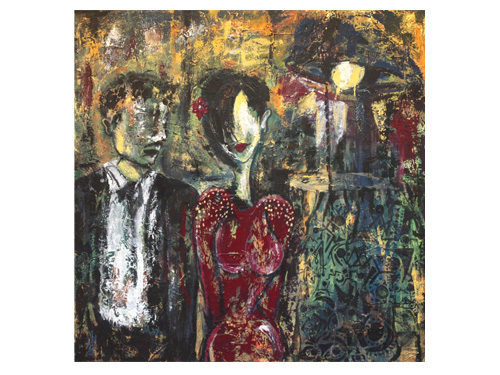The first impression that one has upon entering the Cairo Atelier is misleading. Small groups of artists and intellectuals sit on wicker chairs scattered around the terrace. They sip tea and pull cigarette after cigarette from crumpled packets. The lights dangling from the surrounding trees create a warm glow that gives an impression of calm and tranquillity. But tension exists behind the placid atmosphere. The Atelier is likely facing its biggest crisis since its creation in 1953.
Later today the Cairo Atelier, one of Egypt’s oldest and most prestigious cultural institutions, will elect a new nine members to its board of directors. The previous board was dissolved in June by the Ministry of Solidarity, which supervises NGOs in Egypt.
“The chaos started immediately after the last election,” says Wageeh Wahbah, a painter and former chairman of the board. “Some members, obviously very bitter to have lost the election, filed a complaint to the Ministry of Solidarity, stressing the presence of mismanagement and corruption that tainted the reputation of the board,” he says while taking a drag from his cigarette. The most serious accusations concerned a failure to pay rent for the Atelier’s building for the past four years and the non-transparent use of a 1000 Euro check given to the Atelier by an Italian association.
Salwa Bakr, a famous novelist and a member of the Atelier, was appointed interim commissioner when the scandal erupted. “She was appointed either by the Ministry of Solidarity or the Governor of Cairo, says Said el-Gazzar, another member of the previous board, “to deal with the situation until new elections could be held, but we are unsure why and how she was appointed delegate.”
Despite the fact that el-Gazzar was the leading board member to advance the complaint to the ministry, he, along with the other board members, lost his position when the ministry dissolved the board in June. Bakr, who refused to talk to Al-Masry Al-Youm English Edition prior to the elections, has made headlines this week by condemning the former board for being subjective and advancing members’ personal interests. Some suspect foul play, particularly on the part of Salwa Bakr.
According to Wahbah, Salwa Bakr “broke into the board of directors’ office with the police on her heels, they looted our office and seized every single file and paper in the room!” Bakr’s behavior, Wahbah exclaims furiously, was “nothing but a coup.”
“The Ministry of Solidarity took the decision to dissolve the board without conducting an investigation to determine if the accusations against the board had grounds,” adds Wahba. “Until now, none of the members of the previous board have received any paper officially stating our dismissal, and Salwa Bakr even stripped us of our memberships to the Atelier,” he continues while shrugging his shoulders. According to el-Gazzar, the Ministry of Solidarity officially forbade the members of the last board of directors from running in the next election, but never mentioned that their memberships should be withdrawn. “The ministry was actually unhappy that she cancelled our memberships,” says el-Gazzar, “but she refused to back down on this issue.”
Late on Monday evening the list with the candidates’ names was issued. Twenty-eight members (20 artists and eight writers) have entered the board of directors’ election. Eventually six artists and three writers from among them will be chosen. The list includes artists Reda Abdel Rahman, Said Qammash, and Salah Enani, as well as writer Salah el-Rawi. Unsurprisingly, the names of members of the dissolved board do not appear on the list, though el-Gazzar confessed a few hours before the list was issued that he himself was running for the election.
Atef Ahmed, a visual artist up for election to the board, vocally supports the dramatic measures Bakr took those past few months, saying, “In some situations democracy is appropriate, but when you deal with corruption, dictatorship is the best answer.”

